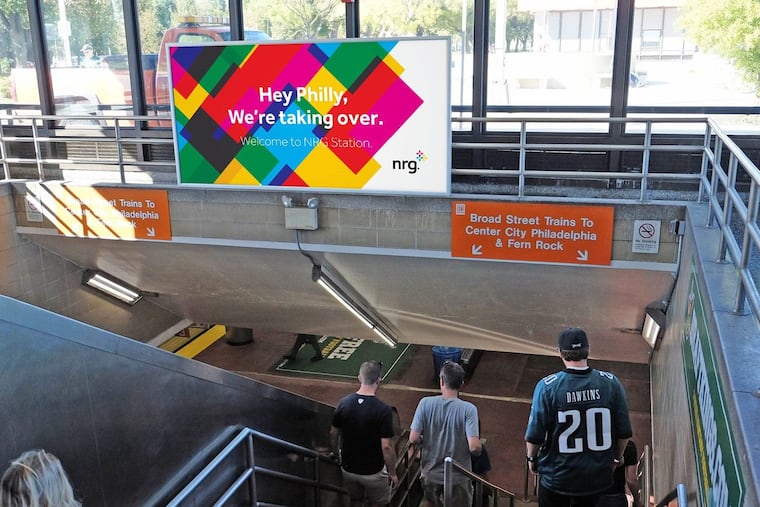SEPTA sells naming rights of AT&T Station to NRG
Where have you gone, Pattison Avenue Station? For the second time, SEPTA resells naming rights of the southern terminus of the Broad State subway.

AT&T is out. NRG is in.
SEPTA has approved changing the name of AT&T Station, the southern terminus of the Broad Street subway, to NRG Station. The subway stop, which serves the stadium complex, previously was known as the Pattison Avenue station.
The station handles about a million rider trips a year, and riders will see changes on Aug. 1, though the official renaming will happen Aug. 14, SEPTA officials said. NRG will pay for replacing signs, maps, and other expenses.
NRG Energy Inc., whose retail energy supply subsidiary is based in Philadelphia, agreed to pay the transit agency $5.25 million under a five-year deal. SEPTA gets 85 percent of that, which will go to its operating budget. The rest goes to Intersection, the company that represented SEPTA in negotiations over the naming rights.
The contract includes two options for extension, each for an additional two years.
The naming rights provide NRG with exclusive rights at SEPTA stations to position salespeople at portable booths to market the company's retail energy supply deals under its NRG Home brand. The company says face-to-face marketing is the primary method it uses to reach potential customers of its competitive retail energy utility supply business.
"What we like about this partnership is the ability to interact with thousands of customers every day," said Mike Starck, vice president and general manager for NRG's eastern retail operations.
The company will staff up to six booths at a time at various SEPTA stations to pitch transit customers on home energy-supply deals, changing locations periodically.
NRG has used the technique previously in SEPTA stations and at large events with success, the company said. NRG has more than 300,000 customers in Pennsylvania, Starck said.
This is third time SEPTA has sold the naming rights to one of its stations to generate income, including the 2014 rebranding of the Market East station as Jefferson Station and the initial 2010 agreement under which SEPTA agreed to rename the Pattison stop as AT&T Station for $5.44 million, a figure that included the cost of updating signs and related expenses. That deal expired, allowing SEPTA to sign up a new sponsor.
The volume of passengers and locations of those two stations make them ideal for marketing, said Rich Burnfield, SEPTA's deputy general manager and treasurer.
"Certainly, the station down at the sports complex [is] very attractive in terms of being able to market that for naming rights," he said.
NRG, with headquarters in Houston and Princeton, already owns the naming rights to NRG Stadium in Houston, which it acquired after its merger with Reliant Energy. It also has an affiliation with the Eagles to provide energy services, including renewable power, at Lincoln Financial Field.
The company will place 12 of its NRG Go portable power pack kiosks at six SEPTA stations and bus terminals, and allow customers to rent a portable power supply for electronic devices for $3.99 a day. The NRG Go kiosks will be placed at City Hall, Olney Transportation Center, Frankford Transportation Center, 69th Street Transportation Center, University City, and NRG Station.
NRG became a major player in the retail energy business with its 2011 acquisition of Energy Plus Holdings LLC, a Philadelphia-based retail electricity and natural gas provider best known for its affiliations with frequent-flier and loyalty programs.